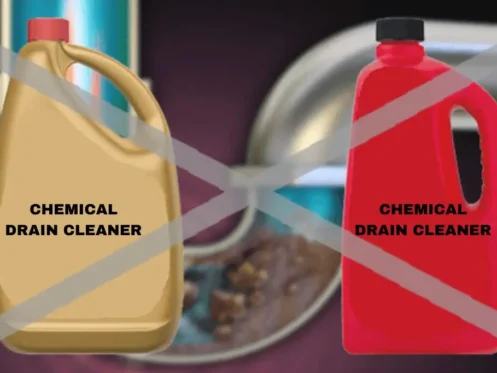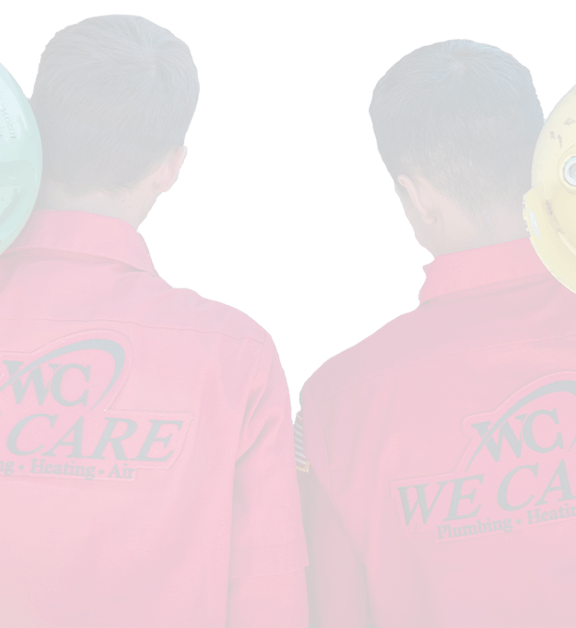When homeowners in Southern California encounter a clogged drain, many reach for the quickest fix—a harsh chemical drain cleaner. After all, the commercials make it seem so simple. Pour, flush, and the problem disappears. While these cleaners might offer a temporary solution, they come with serious consequences for your plumbing, your health, and the environment.
With Earth Day around the corner, it’s the perfect time to reconsider daily practices that may harm the planet and explore safer, more sustainable options for keeping your home running smoothly. Here’s everything you need to know about the impact of harsh drain cleaners and why it’s time to rethink their use.
Misused Quick Fixes: Why People Turn to Harsh Drain Cleaners
It’s easy to see why chemical drain cleaners are so widely used—they’re cheap, readily available, and marketed as convenient miracle solutions to your clogged drains. After all, the promise of dissolving grime and hair instantly with a single pour sounds almost too good to pass up.
However, what often goes unnoticed in the excitement to clear a blockage is the long-term damage these products can cause. Products marketed as “extra strength” or “industrial-grade” may solve the immediate clog, but they don’t address the root issues causing recurring problems. Instead, they often mask deeper plumbing concerns, leaving you with bigger hassles down the line.
But that’s not all. What these cleaners leave behind is a trail of damage—both in your household and in the broader environment.
The Cost of Convenience: Plumbing, Health, and Environmental Impact
Impact on Your Plumbing
Harsh chemical drain cleaners are incredibly corrosive. Most products on the shelves contain strong chemicals like sulfuric acid or sodium hydroxide, designed to break down organic material. While this might sound effective, here’s what they’re also doing:
- Corroding Your Pipes: Frequent use of chemical cleaners can lead to corrosion in both older metal pipes and newer PVC systems. Over time, these chemicals weaken your plumbing, resulting in cracks, leaks, or even total pipe failure.
- Harming Fixtures: The chemical damage doesn’t just stop at your pipes—your sinks, bathtubs, and surrounding hardware can also be discolored or damaged by chemical residue. Once the surface finish of your fixtures starts eroding, replacing these features can burn a hole in your wallet.
Your Health at Risk
It’s not just your plumbing that’s affected—chemical drain cleaners can pose serious risks to you and your family.
- Toxic Fumes: The fumes released when using these cleaners can irritate your eyes, throat, and lungs. Prolonged exposure in poorly ventilated areas could lead to respiratory issues.
- Skin and Eye Burns: Accidental spills or splashes can cause painful burns, especially when these concentrates come into contact with skin or eyes.
- Poisonous Residue: If improperly rinsed, residues of these chemicals can linger in your pipes, potentially contaminating water droplets or steam.
Environmental Consequences
When you flush these products down the drain, they don’t just disappear—they often end up contaminating local waterways and disrupting ecosystems.
- Water Pollution: Harsh chemicals can overwhelm water treatment systems, leading to the contamination of rivers, oceans, and even groundwater sources.
- Harming Wildlife: Aquatic life is particularly vulnerable to the toxic compounds often found in commercial drain cleaners. When these substances reach water bodies, they can harm fish, birds, and other creatures, disrupting delicate ecosystems.
- Contributing to Plastic Pollution: Many drain cleaners come in bulky, single-use plastic containers that often end up in landfills.
Taking all of this into account, it’s a lucky thing for us and the Earth that we have multiple eco-conscious approaches to solve drain problems.
Greener Solutions for Cleaner Drains
The good news is there are effective, safer alternatives to chemical drain cleaners that don’t come with all these harmful side effects. By switching to these eco-friendly fixes, you can keep your pipes clear, protect your family, and do your part for the planet.
1. Prevent Clogs Before They Happen
The best way to keep your drains clean is to prevent clogs before they happen. Use drain strainers to catch hair, food, and debris before they enter your pipes. Avoid pouring grease or oil down the drain, as they harden over time and can cause massive clogs. To prevent minor buildup, flush your drains regularly with warm water and dish soap.
2. Use Natural Cleaning Solutions
To tackle minor clogs naturally, try a mixture of baking soda and vinegar. Pour a cup of baking soda into the drain, followed by a cup of vinegar, and let it sit for 15 minutes before flushing with hot water. For tougher clogs, enzymatic drain cleaners are a safe and eco-friendly option. These cleaners use natural bacteria to break down debris without harming your pipes.
3. Use Professional Drain Cleaning Services
For stubborn clogs, skip the chemicals and call a professional plumber. Professional plumbers use advanced, drain-friendly tools like augers, snakes, and hydro-jetting to safely clear your pipes. You should also schedule an annual drain and pipe inspection to catch issues before they become more serious.
Choose Eco-Friendly Plumbing Solutions Year-Round
Earth Day is a powerful reminder that our everyday decisions impact the environment. Transforming how you tackle a clogged drain may seem like a small step, but together, small steps lead to lasting change—for your home and for the planet.
Are you struggling with frequent clogs? Our team at We Care Plumbing, Heating, & Air is here to help. With personalized, eco-friendly plumbing solutions, we’ll keep your home running smoothly while helping you make environmentally conscious choices.
Contact us online or give us a call today to learn more about our safe drain cleaning services!






